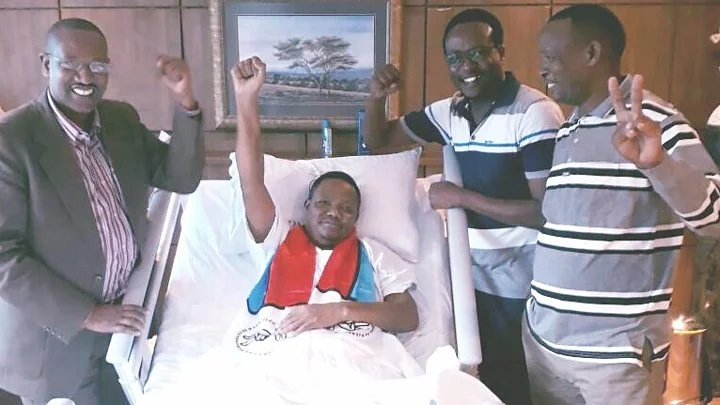This past month I traveled to the United States on a whirlwind, ten-day tour. My trip was coordinated by Vanguard Africa, a Washington, DC-based nonprofit group that is dedicated to the promotion of democratic leadership in Africa. This working visit was packed with closed door meetings and public speaking engagements, including with U.S. government and congressional officials, as well as academic institutions, policy think tanks and major media outlets. During this time, I also prioritized engagement with the Tanzanian diaspora, not only in Washington, DC, but also on subsequent trips to Houston and Birmingham.
What, you may ask, compelled me to make this challenging trip in the brief time I had between two major surgeries? Simply put, the United States matters, and has mattered historically, to Tanzania. As perhaps the most prominent victim of the persecution inflicted on Tanzania’s political opposition and civil society – especially since President John Magufuli came to power in November 2015 – I had to make my voice heard at this critical time.
The U.S. has been one of Tanzania's most consequential development partners since the earliest years of our independence in 1961. But all is not well, and this long-standing relationship is being severely compromised by the increasing repression in Tanzania.
The partnership between the U.S. and Tanzania dates back many years, having been formalized under the Economic and Technical Cooperation Agreement signed by the two countries on February 8, 1968. My country indeed has been, and continues to be, a major recipient of American economic and technical assistance. From massive investments in our energy sector to health and wildlife conservation, American assistance has been instrumental in our development, including through America’s preeminent position in the world’s multilateral financial institutions.
To be sure, Tanzania also matters to the United States. While the two countries do not have bilateral investment and trade agreements, Tanzania is a key member of the East African Community which, in 2008, signed the Trade and Investment Framework Agreement with the U.S., as well as the Trade and Investment Partnership in 2012. The two agreements have expanded trade and much-needed and mutually beneficial dialogue with the private sectors of both countries.
In 2013, American foreign direct investment to Tanzania amounted to an impressive $206 million. By 2016, however, this figure had fallen to under $50 million, a more than 75% decline over a short three-year period. This steep fall is a characteristic feature of the deterioration in investment and business climate that the Magufuli regime has tragically cultivated.
This clear deterioration in the U.S.-Tanzania relationship hurts both countries. For decades, Tanzania has acted as a shock absorber in an otherwise turbulent region, receiving millions of refugees fleeing civil strife. This political stability is now threatened by President Magufuli's oppressive and violent policies back home.
It was for these pressing, altogether urgent reasons that I traveled to the U.S. The trip was undoubtedly successful by any measure. I was pleased to have been well received and listened to attentively in each meeting. Interestingly, I did not have to make new converts, as everywhere I went I found that almost everyone was invariably well-versed in the current situation facing Tanzania. As a result of these high-level meetings, and the media engagements that were organized on my behalf, it is fair to say that Tanzania is now firmly on international radar screens. And rightfully so. The situation is manifestly dire.
Importantly, the days during which the government of Tanzania could commit horrendous human rights abuses with impunity are gone. Hopefully never to return again. From now onwards, any crime or brazen abuse of power that the government and security apparatus commits will only lead to further scrutiny by the international community. This is as it should be.
Like all other countries, Tanzania is a member of the international community of nations. As such, the government has responsibilities, not only to its citizens in terms of our constitution and domestic laws, but also has obligations to the world. By our ratification of, and accession to, various international human rights treaties and conventions, we have promised the world that we will abide by the norms arising out of those covenants. We have entered a pact with the international community and agreed that our conduct shall be judged to the exacting standards demanded of us by these very commitments. If we fall short, we should be called out and pressed to reform.
Therefore, our current president cannot be heard to argue that any outside inquiry into our conduct – especially on human rights and democratic standards – is an unwarranted interference in our internal affairs or a threat to our national sovereignty. This is utter nonsense. It is also out of touch with the interconnected and sophisticated nature of our modern world. Indeed, as I said in my Birmingham speech to a meeting of the Tanzanian diaspora there, quoting Dr. Martin Luther King Jr.'s now famous Letter from the Birmingham City Jail: "An injustice anywhere is a threat to justice everywhere." This sentiment remains just as true today as it did in 1963. We would all be well served to adhere to such wisdom at this time, in Tanzania an elsewhere.
Tundu AM Lissu
Tienen, Belgium
March 25, 2019.
Honorable Tundu Lissu is a Tanzanian Member of Parliament, as well as the Attorney General and Central Committee member for CHADEMA, and the Chief Whip of the Official Opposition in Tanzania's Parliament. Hon. Lissu is a longtime activist for democracy and human rights in Tanzania, and a practicing attorney. Between 2016 and July 2017, he was repeatedly arrested, unjustly detained and charged in court with arbitrary crimes due to his criticism of the ruling government. In September 2017, Lissu was targeted in a failed assassination attempt, suffering 16 bullet wounds The attack remains unsolved and no suspects have been identified nor any arrests made.
DISCLAIMER: The views expressed in this publication do not necessarily reflect the views of Vanguard Africa or the Vanguard Africa Foundation.

